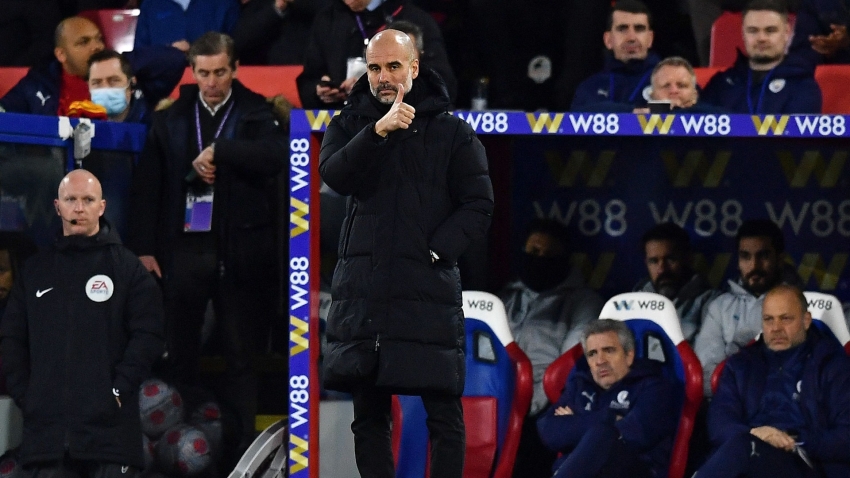Manchester City’s Premier League title defense hit another stumbling block as the champions were forced to twice come from behind in a 2-2 draw at Crystal Palace, leading manager Pep Guardiola to grimly acknowledge this campaign as a “season to suffer.”
The disappointing result at Selhurst Park has left City eight points adrift of league leaders Liverpool, having played an additional game, and showcased the ongoing struggles of a team that dominated English football last season. The draw represents another setback in what has become an increasingly challenging period for the defending champions.
Despite showing resilience to fight back twice against Palace, City’s performance lacked the commanding authority that has defined their recent seasons of success. Guardiola’s candid post-match assessment reflected the team’s current predicament, as he told BBC Sport: “We take a point. We fought incredible and came back twice. We’ll see what happens in the last month. We tried. Big compliment for the opponent.”
The Spanish manager’s reluctance to discuss title aspirations speaks volumes about City’s current form. “We cannot talk about the title race when we lose four games in a row and draw,” Guardiola stated, highlighting the severity of their recent slump. His focus has shifted to more immediate concerns, particularly the recovery of injured players and restoring the team’s confidence.
City’s struggles this season can be attributed to a combination of factors, including injuries to key players, inconsistent performances, and a noticeable dip in the team’s usual high standards. The absence of their trademark dominance has been particularly evident in recent matches, with the team struggling to control games as effectively as they have in previous campaigns.

The timing of this downturn couldn’t be more challenging for City, as they face a crucial Champions League fixture against Juventus on Wednesday. Currently sitting 17th in the league phase, the team needs positive results to secure a top-eight finish after disappointing performances against Sporting CP and Feyenoord.
Guardiola’s acknowledgment that “it’s difficult in the situation we have” suggests a manager grappling with circumstances beyond his control. However, his praise for his players’ fighting spirit – “I’m really pleased for the players – they fought and did everything” – indicates he hasn’t lost faith in his squad’s ability to overcome their current difficulties.
The draw against Palace exemplifies City’s current predicament. While they showed character to equalize twice, their inability to secure all three points highlights the gap between their current form and the exceptional standards they’ve set in recent years. The team that swept to a historic treble last season now finds itself struggling to maintain consistency in domestic competition.
This period of “suffering,” as Guardiola describes it, marks unfamiliar territory for a Manchester City side that has dominated English football in recent years. The manager’s focus on taking things game by game, rather than looking at the bigger picture of the title race, suggests a pragmatic approach to navigating this challenging period.
The situation becomes even more pressing considering the competitive nature of this season’s Premier League. With Liverpool setting a strong pace at the top and other contenders showing consistency, City’s margin for error continues to shrink. The eight-point gap, while not insurmountable given City’s previous comebacks, represents a significant hurdle for a team currently struggling to find its rhythm.
Looking ahead, Guardiola faces the challenging task of lifting his team for their midweek European encounter with Juventus. The Champions League provides an opportunity for City to regain some momentum, but it also adds to the pressure on a squad already showing signs of strain.
As the season progresses, the key question will be whether this period of “suffering” represents a temporary blip or a more significant decline in City’s dominance. Guardiola’s track record suggests he has the capability to turn things around, but the immediate challenge is to restore confidence and consistency to a team that appears to have lost some of its characteristic swagger.



